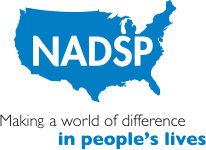
The Time For Advocacy Is Now!
The following article is part of an ongoing series about the NADSP Competency Areas. The NADSP Competency Areas offer DSPs the opportunity to address challenges, work on issues identified by the person they support, or assist a person in pursuing a particular goal. Each Competency Area has corresponding skill statements that describe the knowledge and skills DSPs must have to demonstrate competency in each area.
This blog is about the skill statement “The competent DSP has current knowledge of laws, services, and community resources to assist and educate participants to secure needed supports,” within the NADSP Competency Area: “Advocacy.”
Inside The Competency Area
Advocacy
Direct support professionals play a crucial role in providing supports and assistance to individuals with disabilities. Advocacy is a broad competency area and has never been more important for direct support professionals to embrace as it is now. Understanding the laws, regulations, and resources that govern disability services is essential for direct support professionals to ensure they provide the best supports while also protecting the rights of the individuals they serve.
By understanding these laws, regulations, and resources, direct support professionals can enhance their effectiveness in supporting individuals with disabilities while ensuring compliance with the necessary legal frameworks. Advocacy is more than what direct support professionals provide with the people they support. They must also consider the “big picture” and what it means to be a professional in a larger system.
The competent DSP has current knowledge of laws, services, and community resources to assist and educate participants to secure needed supports.
Inside The Skill Statement
The competent DSP has current knowledge of laws, services, and community resources to assist and educate participants to secure needed supports.
Advocacy with and for people with developmental disabilities is a crucial aspect of promoting their rights, ensuring access to necessary services, and fostering inclusion in society. Furthermore, advocacy for people with developmental disabilities is a collective effort that requires collaboration, education, and commitment. By promoting awareness, empowering individuals, engaging with policymakers, and ensuring access to necessary services, direct support professionals can make a meaningful difference in the lives of those with developmental disabilities and contribute to a more inclusive society.
Many direct support professionals do not feel that they have any “power” or influence. The opposite is actually true. When legislators, policy makers and administrators of provider organizations and employers hear from direct support professionals, it is almost always welcomed and useful in the improvement of services and supports.
Understanding The Laws
Here are some laws for direct support professionals to understand and to familiarize themselves with, as they practice direct support and embrace their obligation in the Advocacy competency:
Americans with Disabilities Act (ADA)
This is civil rights law which prohibits discrimination based on disability in various areas, including employment, public accommodations, and transportation.
Individuals with Disabilities Education Act (IDEA)
This law ensures that children with disabilities have access to free, appropriate public education tailored to their individual needs.
Medicaid and Medicare
These are programs that provide health coverage for eligible individuals, including those with disabilities.
Developmental Disabilities Assistance and Bill of Rights Act (DD Act)
This law supports people with disabilities and families to design and influence policies that affect their lives.
You should familiarize yourself with these laws. They protect individuals with developmental disabilities and ensure their rights are upheld. In addition to federal laws, you should understand local and state regulations that impact individuals with developmental disabilities, including eligibility for services and funding opportunities. Each state may have specific laws governing disability services, including licensing requirements for service providers and regulations specific to support services.
Putting It All Into Practice
Advocacy efforts often involve educating the public about developmental disabilities to reduce stigma and promote inclusivity. This can include community outreach, workshops, and presentations. You can utilize social media to raise awareness about the challenges faced by individuals with developmental disabilities and to promote advocacy events.
You can also encourage individuals with developmental disabilities to speak up for themselves, make decisions about their lives, and share their experiences. Self-advocacy training can be vital in this process. Provide resources and support for families and caregivers to help them advocate effectively for their loved ones. Advocate for policy changes by engaging with local, state, and federal legislators. This can involve attending town hall meetings, contacting representatives, and participating in advocacy days.
Collaborate with other organizations, advocacy groups, and stakeholders to strengthen the advocacy message and increase impact. Advocate for better access to healthcare, education, employment, and housing services for individuals with developmental disabilities. This includes addressing barriers to accessing these services. Support efforts to secure funding for programs and initiatives that benefit individuals with developmental disabilities, including funding for education, job training, and community support services.
Advocate for inclusive practices in schools, workplaces, and community settings. This includes promoting policies that support diversity and accommodate individuals with developmental disabilities. Encourage participation of individuals with developmental disabilities in community activities, ensuring they have opportunities to contribute and be part of society. Encourage reporting of any violations of rights or discriminatory practices against individuals with developmental disabilities.
Quick Tips
How can you help embrace this skill statement and implement it? Here are some quick tips!
-
- Learn about the history of the disability rights movement.
- Work with self-advocates and engage with any groups in your area.
- Take classes about topics like Medicaid, Medicare and public assistance.
- Follow the latest news on Medicaid and Medicare funding.
- Stay up-to-date on current events and news related to other disability funding.
- Attend town hall types of meetings with the people you support and other direct support professionals.
- Do not be afraid to contact your organization’s leadership and ask questions about anything related to laws, regulations, funding etc.
- Ask your employer to offer opportunities to engage with local representatives and politicians in order to learn what they do. That is also an opportunity for them to learn about what you do as a direct support professional.
Relevant Resources
There are many resources for direct support professionals. For instance, there are hundreds of training programs and resources. Many organizations offer training for on topics such as person-centered planning, communication strategies, and crisis intervention techniques. There are many Advocacy organizations/groups. There are many local nonprofits that can provide resources and support. Get familiar with government resources. There are professional networks to partner with. Joining organizations such as the National Alliance for Direct Support Professionals (NADSP) can provide access to resources, training, and networking opportunities.
- Centers for Medicare and Medicaid Services (CMS)
- Autistic Self Advocacy Network (ASAN)
- Self-Advocates Becoming Empowered (SABE)
- Impact: Self-Advocacy
- Frontline Initiative: Legislative Advocacy
- The National Alliance for Direct Support Professionals (NADSP)
- American Network of Community Options and Resources (ANCOR)
NADSP Competency Areas
The NADSP Competency Areas offer DSPs the opportunity to address challenges, work on issues identified by the person they support, or assist someone in pursuing a goal.
You May Also Be Interested In …

Let’s Talk: Beyond Companionship: How Dogs Support People To Thrive

Let’s Talk: The Art of Connection: Establishing and Repairing Rapport in Direct Support Settings

Let’s Talk: Summertime and The Living Should Be Easy: Supporting People with Significant Intellectual and Developmental Disabilities in Summer Activities

Let’s Talk: Embracing Diversity Equity and Inclusion: A Pathway to Professional Excellence for DSPs

Let’s Talk: Burnout: Reclaiming Mental Wellness in Direct Support Work

Let’s Talk: Flipping the Switch: Compassion Fatigue to Compassion Satisfaction and Psychological Safety for Direct Support Professionals

Let’s Talk: Sexuality and Healthy Relationship Knowledge is Power

Let’s Talk: Balancing Joy, Boundaries, and Belonging: The Ethical Role of DSPs in Holiday Celebration and Connection

Webinar: The Future of COVID-19 and Vaccines

